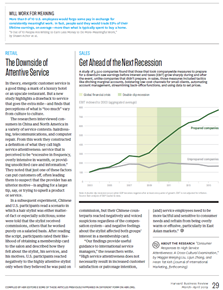Recently, LIU Wenjing, Associate Professor in Department of Marketing, Tsinghua University School of Economics and Management (Tsinghua SEM), published a research paper as the first author and co-corresponding author in the March 2019 issue ofJournal of International Marketing, an A-list marketing journal and a journal of American Marketing Association. The paper is coauthored with ZHANG Liju, Assistant Professor at Shaanxi Normal University, and Hean Tat Keh, Professor at Monash University, entitled “Consumer Responses to High Service Attentiveness: A Cross-Cultural Examination.”Harvard Business Reviewreported this paper in its March and April issue of 2019 with the title of “The Downside of Attentive Service.”

“The Downside of Attentive Service”, March and April issue of 2019,Harvard Business Review
The beginning of theHarvard Business Reviewarticle writes that “in theory, energetic customer service is a good thing: a mark of a luxury hotel or an upscale restaurant. But a new study highlights a drawback to service that goes the extra mile—and finds that perception of what is ‘too much’ vary from culture to culture.”
Professor LIU’s research paper believes that while the literature generally indicates that service attentiveness can increase consumer satisfaction, providing extra care and attention in service encounters may backfire and lead to negative consumer outcomes. In addition, due to cross-cultural differences, the effects of high service attentiveness may vary across international markets. The authors conducted a qualitative study, a field experiment, and two laboratory experiments in three countries (Canada, the U.S., and China) across various service contexts (hairdressing, telecommunications, and computer repair) to examine cross-cultural consumer responses toward high service attentiveness. The paper identifies three attributes of high service attentiveness: frequent contact, intensive warmth, and unsolicited information and care. Consumers’ negative responses toward high service attentiveness are mediated by their suspicion of ulterior motive, which varies according to their self-construal. Specifically, consumers with an interdependent self-construal tend to have greater suspicion of and negative responses toward high service attentiveness. Moreover, compared with Canadian and American consumers, Chinese consumers may have a higher base level of suspicion toward out-group member and are more likely to show negative responses to high service attentiveness. The paper contributes to several streams of research and provides useful guidance to service managers across the world.

LIU Wenjing is an Associate Professor and Ph.D. Student Advisor in the Marketing Department at Tsinghua University School of Economics and Management. She received her Ph.D. in Marketing from Rotman School of Management, University of Toronto in 2010. Her research areas include consumer behaviors, services marketing, interpersonal interactions, consumption experience, and pricing. She has published multiple papers in leading international academic journals such as Journal of Consumer Psychology, Journal of International Marketing, Marketing Letters, Journal of Service Theory and Practice, Journal of Economic Psychology, and Advances in Consumer Research. She is author of book chapters in Handbook of Consumer Psychology, International Handbook of Consumer Psychology, and Customer-Brand Relationships.
 Latest News
Latest News